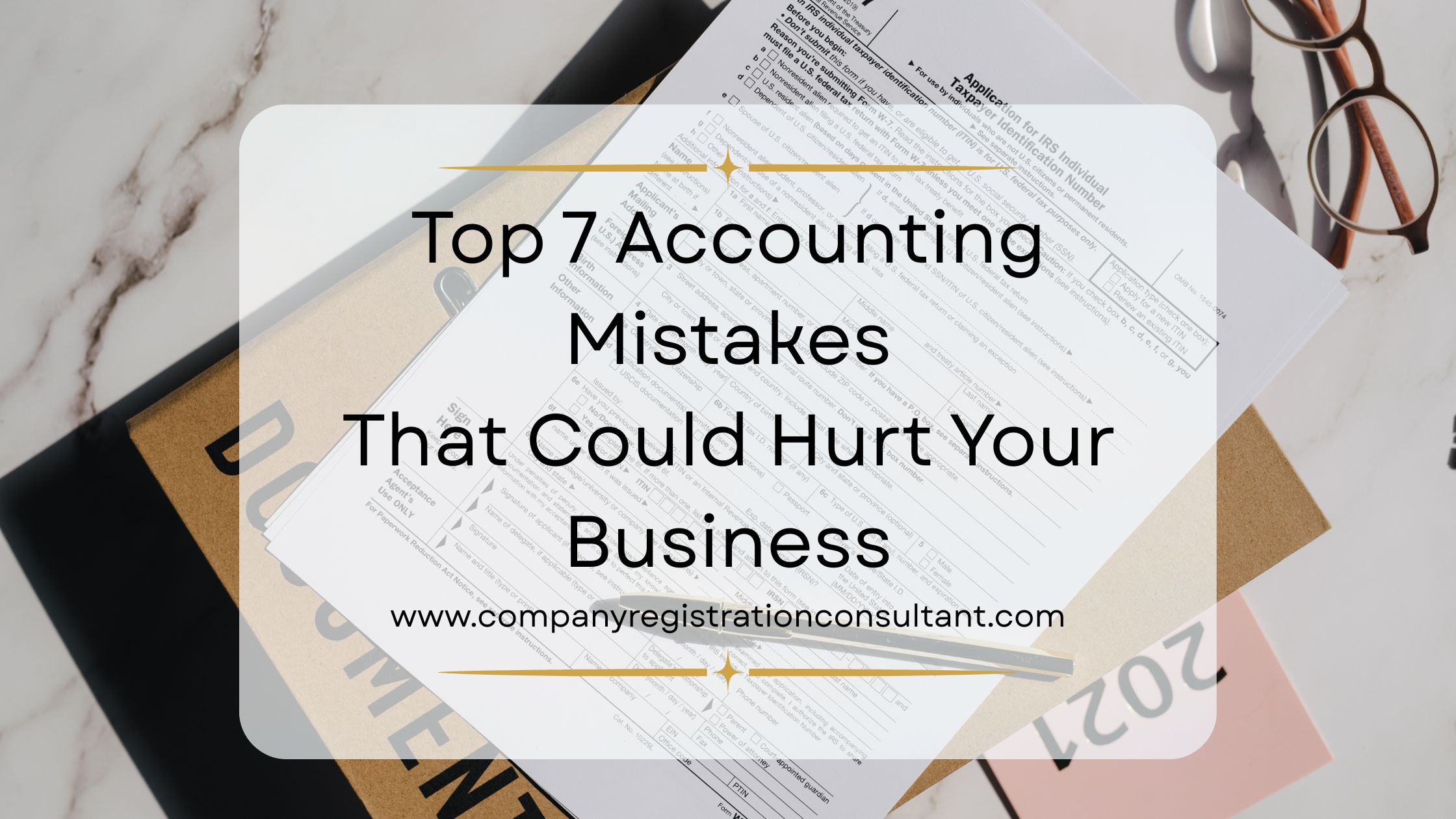Running a successful business isn’t just about sales, marketing, or innovation—it’s also about financial discipline. Yet, many entrepreneurs overlook proper accounting practices, often considering them an afterthought. This can lead to costly consequences like cash flow problems, compliance issues, and even legal trouble.
At Ruchita Dang & Associates, we’ve seen firsthand how minor bookkeeping errors can snowball into major setbacks. In this blog, we’ll uncover the top 7 accounting mistakes that could hurt your business and how to avoid them.
1. Mixing Personal and Business Finances
One of the most common mistakes small business owners make is using the same bank account or credit card for both personal and business expenses. This creates a messy trail that’s hard to audit and makes it difficult to understand your true business performance.
Why it hurts:
It complicates tax filing, raises red flags during audits, and increases the risk of overlooking deductible expenses.
How to avoid it:
Open a separate business bank account and use dedicated cards for all business-related transactions.
2. Not Recording Expenses in Real-Time
Delaying the recording of transactions often leads to lost receipts, misreported amounts, and forgotten entries. Waiting until tax season to “figure things out” is not a strategy—it’s a recipe for chaos.
Why it hurts:
It distorts your cash flow visibility and increases the risk of underreporting or overreporting expenses.
How to avoid it:
Use digital accounting software or mobile apps to log expenses regularly. Automate whenever possible.
3. Poor Invoice Management
Late invoicing or forgetting to follow up on unpaid invoices can disrupt cash flow and affect your ability to pay vendors and employees on time.
Why it hurts:
Uncollected receivables mean your business is losing money without realizing it.
How to avoid it:
Set clear invoicing terms, automate reminders, and monitor accounts receivable closely every week.
4. Not Reconciling Bank Statements
Many business owners trust their bank balance blindly without matching it with their internal accounting records. This is dangerous, especially if you’re making strategic decisions based on these numbers.
Why it hurts:
It can hide discrepancies like fraudulent charges, double payments, or missed deposits.
How to avoid it:
Reconcile your bank statements monthly. Accounting software like QuickBooks, Zoho Books, or Tally makes this easy.
5. Ignoring Tax Deadlines and Compliance
Filing GST returns late, missing advance tax payments, or failing to deduct TDS can invite hefty penalties and interest.
Why it hurts:
Non-compliance damages your business’s financial standing and credibility with stakeholders.
How to avoid it:
Maintain a tax calendar or engage a professional accountant to ensure you’re always on track with deadlines.
6. Overlooking Payroll Accuracy
Miscalculating employee salaries, deductions (like PF, ESIC), or delays in issuing payslips can lead to employee dissatisfaction and compliance issues.
Why it hurts:
Incorrect payroll can lead to fines from labor departments and affect team morale.
How to avoid it:
Use a reliable payroll system and double-check calculations, especially when bonuses or variable pay are involved.
7. Not Hiring a Professional Accountant
Many startups and SMEs try to managetheir finances themselves to save costs. But without proper knowledge of accounting principles, tax laws, or compliance requirements, this often does more harm than good.
Why it hurts:
DIY accounting may result in inaccurate reports, missed deadlines, and bad financial decisions.
How to avoid it:
Hire a qualified accountant or outsource to an expert firm like Ruchita Dang & Associates to ensure financial accuracy and peace of mind.
Conclusion: Stay Financially Smart
Accounting mistakes don’t just affect your books—they affect your business’s health, stability, and future. By being aware of these common pitfalls and putting systems in place, you can stay ahead of financial trouble and focus on growth.
Frequently Asked Questions (FAQs)
1. Why is proper accounting important for small businesses?
Proper accounting helps track income and expenses, ensures tax compliance, improves cash flow management, and enables better business decisions. Without it, businesses may face financial losses, penalties, or even closure.
2. What are the consequences of mixing personal and business finances?
Mixing finances leads to confusion during tax filing, limits your ability to claim deductions accurately, and can even expose your personal assets to business liabilities in legal cases.
3. How often should I update my books of accounts?
Ideally, you should update your books weekly or at least monthly. Regular updates ensure real-time visibility into your business performance and reduce errors at year-end.
4. What is the best way to handle unpaid invoices?
Set clear payment terms, follow up consistently with reminders, charge late fees if necessary, and consider using invoicing software to automate tracking and follow-ups.
5. Can I handle my accounting using Excel or do I need software?
While Excel can work for very small businesses, it lacks automation, integration, and error detection features. Accounting software like Zoho Books, QuickBooks, or Tally is more efficient, secure, and scalable.
6. When should I hire a professional accountant?
You should consider hiring an accountant from the start, especially if you’re unfamiliar with taxation, payroll, or compliance. They’ll help you stay compliant and avoid costly mistakes as your business grows.


